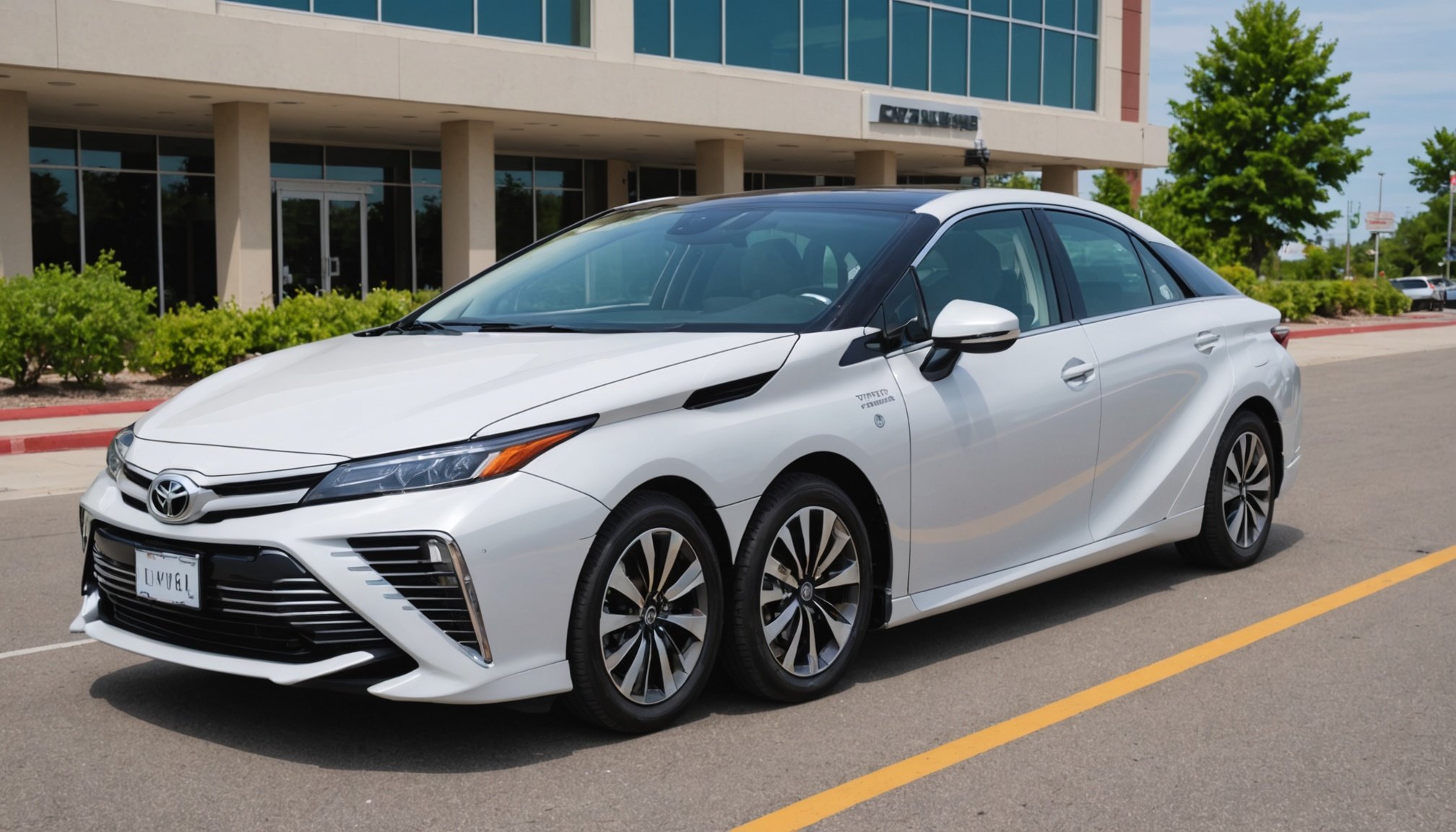Overview of Hydrogen Fuel Conversion Kits
Hydrogen fuel conversion kits have become increasingly popular as eco-friendly alternatives for vehicles. At the heart of this technology is the ability to convert a traditional gasoline engine into one that can run on hydrogen. This process involves integrating a hydrogen fuel conversion kit, which modifies the fuel system to effectively use hydrogen as a fuel source.
Converting a Toyota Mirai to hydrogen fuel can offer several benefits. The Toyota Mirai, initially designed as a hydrogen fuel cell vehicle, can be upgraded using advanced conversion kits to enhance its efficiency and reduce emissions further. This not only improves vehicle performance but also promotes a cleaner environmental footprint, contributing to reduced greenhouse gas emissions.
In the same genre : The Definitive Handbook: Pro Tips for Mounting a Carbon Fiber Spoiler on Your BMW M4
There are various types of hydrogen fuel conversion kits available, catering to different vehicle models and specifications. Some kits focus on increasing fuel efficiency, while others aim to optimise emission levels. It’s essential to choose the right kit that suits the specific needs of your vehicle and comply with relevant emission regulations. Understanding these options ensures that you can make an informed decision about the best conversion kit for your Toyota Mirai or other hydrogen-compatible vehicles.
Required Tools and Materials
Installing a hydrogen fuel conversion kit successfully demands meticulous preparation and the right installation tools. Ensuring you have all necessary materials and tools before starting the process can significantly streamline the conversion and safeguard against errors.
Also to see : Mastering Volkswagen Jetta TDI: The Comprehensive Fuel Pressure Regulator Adjustment Handbook
Essential Tools for Installation
A comprehensive set of fuel conversion tools is critical. Start by gathering essentials like wrenches, screwdrivers, and a torque wrench for precise adjustments. A multimeter will help assess electrical components, while a digital fuel pressure gauge assists in checking system parameters.
Materials Required for Conversion
Beyond tools, specific materials are crucial for a seamless conversion. This includes hoses designed for hydrogen compatibility, sealed fuel cells, and high-quality connectors for reliable system integration. Ensure the materials meet industry standards for hydrogen compatibility to enhance system safety and efficiency.
Recommendations for Purchasing
Procurement of tools and materials should focus on quality and compliance. Consider buying from reputable automotive supply stores or certified online platforms. Look for components specifically rated for hydrogen use to ensure durability and safety. Many vendors offer adjustable kits tailored to the Toyota Mirai, enabling customization based on unique needs.
Safety Precautions
Handling hydrogen during the installation of fuel conversion kits requires strict adherence to safety measures. Hydrogen, with its highly flammable nature, necessitates extreme caution. Proper installation precautions must be in place to prevent accidents and ensure the safety of everyone involved.
Personal Protective Equipment (PPE) is crucial during the installation process. Wearing goggles, gloves, and flame-retardant clothing can protect against unforeseen accidents. Above all, well-ventilated spaces minimize the risk of hydrogen accumulation, curtailing explosion risks.
Before starting, thoroughly inspect and secure all connections to prevent leaks. Use hydrogen-compatible tools and avoid any sparks or open flames nearby. It’s essential to routinely test for leaks using an appropriate hydrogen detector.
Adopting strict guidelines for safe installation practices can mitigate risks significantly. Ensure all personnel involved are well-trained and familiar with the safety protocols. In addition to practical training, periodically reviewing the safety measures guidelines ensures everyone remains aware of potential hazards.
Finally, always have a comprehensive emergency plan. Outline clear instructions in the event of an incident, including evacuation routes and first aid measures. Prioritizing safety at every step safeguards not only the integrity of the conversion process but also all individuals involved.
Step-by-Step Installation Process
Converting your vehicle with a hydrogen fuel kit installation can seem daunting, but following a structured process helps ensure a smooth experience.
Preparing the Vehicle
To begin the installation guide, thoroughly check your Toyota Mirai’s existing fuel system. Identify and remove any old components that may interfere with the new setup. Confirm that all existing parts are in good condition and ready for the conversion. This preparation ensures compatibility and minimises potential issues.
Installing the Conversion Kit
Start by carefully following the DIY steps specific to the Toyota Mirai. Position the hydrogen fuel conversion kit appropriately, paying close attention to the manufacturer’s diagram. This alignment is crucial for the system’s integrity. Use precise tools for fitting, ensuring all connections are tight and secure. Be vigilant about potential pitfalls, such as misalignments or loose fittings, which could lead to inefficiencies.
Finalizing the Installation
After securing all components, test the system’s integrity by checking for possible leaks or malfunctions. Use diagnostic tools to assess functionality, making necessary adjustments to optimise performance. Ensuring everything is properly sealed and secure will help provide reliable and efficient vehicle operation post-conversion.
Troubleshooting Common Issues
Working with hydrogen fuel conversion kits can sometimes present challenges. Identifying and resolving these issues early ensures your Toyota Mirai maintains peak performance.
Common Installation Problems
Once the hydrogen conversion is complete, certain fuel system issues may arise. Leaks, unusual noises, or a drop in engine performance can be tell-tale signs of underlying problems. To troubleshoot these, verify all connections are secure and inspect for wear on hoses and fittings. Detecting leaks early prevents further damage and maintains optimal efficiency.
Diagnostics and Maintenance
Regular diagnostic checks are essential. Using a diagnostic tool helps identify specific errors within the fuel system. This not only aids in detecting problems but also supports regular maintenance, ensuring the conversion kit’s longevity.
Resources for Troubleshooting
Accessing comprehensive resources can significantly aid the troubleshooting process. Official Toyota manuals and authorized service centers provide valuable insights into resolving more complex issues. Online forums and user groups are also beneficial, offering shared experiences and solutions from other Toyota Mirai owners.
Maintaining your conversion kit through routine checks and leveraging available resources ensures a seamless hydrogen fuel experience, maximizing benefits and minimizing downtime.
Upgrades and Enhancements
Exploring performance upgrades for your hydrogen fuel conversion kit can significantly enhance your vehicle’s capabilities. Post-installation, various kit enhancements are available. These modifications improve fuel efficiency, boost power, and extend the lifespan of your Toyota Mirai’s conversion system.
Several options for upgrading include advanced fuel control systems and enhanced hydrogen injection methods. These upgrades focus on optimizing fuel delivery, ensuring that your vehicle operates at peak efficiency. By using more precise fuel maps, the engine can benefit from improved combustion processes, ultimately leading to reduced fuel consumption and lower emissions.
Furthermore, integrating new technologies like hydrogen-on-demand systems can offer significant advantages. These systems produce hydrogen only when needed, offering a more efficient and eco-friendly solution. Such technology combinations contribute to a more reliable and responsive driving experience.
For those seeking to maximize their conversion kit’s potential, careful consideration of available enhancements and ongoing technological developments is crucial. Staying informed about the latest advancements in hydrogen fuel technology ensures that your Toyota Mirai remains at the forefront of sustainable driving solutions.
Legal Considerations and Compliance
Converting a vehicle, like the Toyota Mirai, to use hydrogen fuel involves navigating various legal landscapes to ensure safe and compliant operation. It’s crucial to adhere to pertinent emissions regulations that govern the usage of alternative fuels. These regulations vary by region and can influence kit specifications and installation procedures. Understanding local laws helps avoid legal pitfalls and ensures the conversion process aligns with established standards.
When considering modification, a keen awareness of legal requirements is essential. Vehicles utilizing hydrogen fuel must comply with specific safety and environmental standards. This compliance not only guarantees roadworthiness but also supports sustainable driving initiatives. Laws often dictate emission levels and mandate regular inspections to verify that conversions meet prescribed thresholds.
Recommendations for maintaining compliance center on thorough research and consultation with authorized professionals. Engaging with certified inspectors or regulatory bodies can provide invaluable insight into legal requirements. Additionally, keeping updated with changes in legislation helps maintain uninterrupted legal conformity. The goal is to enjoy the benefits of hydrogen fuel while respecting the framework set by environmental authorities for a responsible and eco-friendly driving experience.
Functionality and Benefits of Hydrogen Fuel Conversion
Understanding the functionality and benefits of hydrogen fuel conversion provides insights into its impact on vehicle performance and environmental benefits. This process involves transforming traditional fuel systems to harness the power of hydrogen, resulting in a more sustainable energy model for cars like the Toyota Mirai.
Hydrogen fuel offers exceptional vehicle performance by promoting efficient combustion and reducing engine wear, contributing to a smoother and quieter ride. The high energy content of hydrogen leads to increased efficiency and longer driving ranges compared to conventional fuels. These benefits make hydrogen conversion appealing for those seeking to maximize their vehicle’s potential.
Environmentally, hydrogen presents a formidable solution to reducing emissions. By converting to hydrogen fuel, vehicles contribute significantly to lowering greenhouse gases, as the primary byproduct is water vapour rather than carbon dioxide. This environmental impact aligns with global efforts for cleaner air and ecological conservation.
Economically, though the initial investment in conversion kits may seem steep, long-term savings emerge from reduced fuel costs and maintenance expenses. User testimonials often highlight satisfaction with the conversion’s effectiveness, underscoring hydrogen fuel’s role in driving towards an eco-friendly future while enjoying enhanced vehicle performance.





